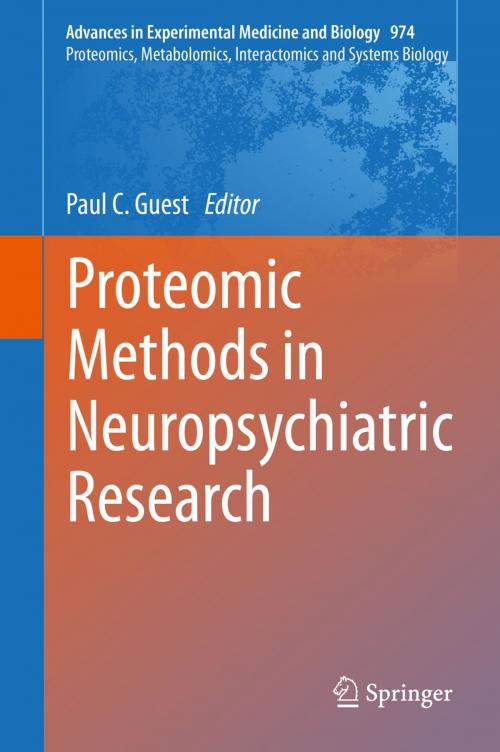Proteomic Methods in Neuropsychiatric Research
Nonfiction, Health & Well Being, Medical, Medical Science, Genetics, Science & Nature, Science, Biological Sciences, Biochemistry| Author: | ISBN: | 9783319524795 | |
| Publisher: | Springer International Publishing | Publication: | March 28, 2017 |
| Imprint: | Springer | Language: | English |
| Author: | |
| ISBN: | 9783319524795 |
| Publisher: | Springer International Publishing |
| Publication: | March 28, 2017 |
| Imprint: | Springer |
| Language: | English |
Due to continuous technical developments and new insights into the high complexity of neurological diseases, there is an increasing need for the application of proteomic technologies which can yield potential biomarker readouts for improved clinical management as well as for the development of new drugs by struggling pharmaceutical companies. This book describes the step-by-step use of proteomic methods such as two-dimensional gel electrophoresis, multiplex immunoassay, liquid chromatography mass spectrometry (LC-MS) and selective reaction monitoring MS, to increase our understanding of these diseases, with the ultimate aim of improving patient care.
The volume will be of high interest to clinical scientists, physicians and pharmaceutical company scientists as it gives insights into the latest technologies enabling the revolution of personalized medicine. It is of direct interest to both technical and bench biomarker scientists as it gives step by step instructions on how to carry out each of the protocols. It is also of interest to researchers as each technique will be presented in the context of a specific neurological disorder, including Alzheimer's disease, multiple sclerosis, autism spectrum disorders, schizophrenia, major depressive disorder and bipolar disorder.
Finally, it will also highlight the future research efforts in this field, which are endeavoring to convert proteomic platforms to the form of hand held devices which can be used in a point of care setting and return diagnostic results within the timeframe of a visit to the general practitioner.
Due to continuous technical developments and new insights into the high complexity of neurological diseases, there is an increasing need for the application of proteomic technologies which can yield potential biomarker readouts for improved clinical management as well as for the development of new drugs by struggling pharmaceutical companies. This book describes the step-by-step use of proteomic methods such as two-dimensional gel electrophoresis, multiplex immunoassay, liquid chromatography mass spectrometry (LC-MS) and selective reaction monitoring MS, to increase our understanding of these diseases, with the ultimate aim of improving patient care.
The volume will be of high interest to clinical scientists, physicians and pharmaceutical company scientists as it gives insights into the latest technologies enabling the revolution of personalized medicine. It is of direct interest to both technical and bench biomarker scientists as it gives step by step instructions on how to carry out each of the protocols. It is also of interest to researchers as each technique will be presented in the context of a specific neurological disorder, including Alzheimer's disease, multiple sclerosis, autism spectrum disorders, schizophrenia, major depressive disorder and bipolar disorder.
Finally, it will also highlight the future research efforts in this field, which are endeavoring to convert proteomic platforms to the form of hand held devices which can be used in a point of care setting and return diagnostic results within the timeframe of a visit to the general practitioner.















